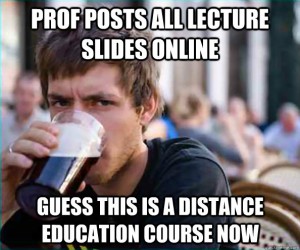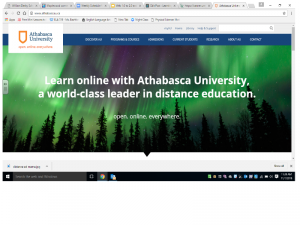I couldn’t resist the urge to begin this post with some humour. If you need a good laugh, check out others at Lazy College Senior Memes.
This post marks the midway point of the semester of my very last Master’s course! As I sit here, I reflect on my experiences with distance education tools and the impact they have had on my learning. I actually have a fairly long history with distance education. I grew up in the very small town of Earl Grey, SK. Until 2004, we had a K-12 school with about 100 students. We were always double-graded, and course offerings were limited. We would travel to the neighboring town for Home Economics and Industrial Arts, and classes like Calculus simply were not offered. We did however, have French instruction from K-6, and this was of interest to me. In Grade 8, a friend and I decided we wanted to continue learning French, and enrolled in French 8 through correspondence school. What a ride that was! The course modules arrived in large, bubble-wrap lined envelopes. Each module was complete with a package of information, a workbook, and a cassette tape (yes, a cassette tape!) to listen to audio recordings. Even though my friend and I were both very good students, this was the hardest thing I have ever tried to do. We had attempted to learn something so new and so challenging without the help of a teacher. We gave it a good shot, but in the end we decided that correspondence school wasn’t for us, and lost the $150.00 deposit we had paid!
Fast forward about 10 years, and I had my next experience with Distance Education. I was enrolled at the University of Saskatchewan and living and working in Luseland, SK, nearly 3 hours away. After a semester off, I wanted to get back into my studies and enrolled in a distance education 100-level geography class. As I look back, not a lot had changed in 10 years. The modules still came in the mail, and assignments were sent back and forth via “snail mail” to be graded. On occasion, I would fax an assignment if it was really close to the deadline- that’s a techie as it got! Exams still had to be written on-site at the University.
After I completed by BSc and my BEd, I began teaching in rural SK. I accepted a full-time continuing Senior Science position and realized I wanted to be accredited. This meant I needed 3 more university Chemistry courses. After looking at my options, I elected to enroll through Athabasca University– well known for it’s distance education programs. Again, little had changed. Course materials (including very heavy textbooks!) were mailed and returned via mail, and exams needed to be written at an accredited invigilation centre, which in my case was an hour away.
When I enrolled in the University of Regina Master’s program in Winter 2012, I was looking primarily at online options. I have 2 young children, and live almost an hour from Regina. That semester, I took one course on-site and one online. It was EC&I 830– Seminar on Curriculum & ICT (*Note: this course has since changed to Contemporary Issues in Educational Technology). The course was online, but it wasn’t very interactive. It was asynchronous, and we never actually met (either face-to-face or through web cams) our professor or colleagues. The course was primarily written communication– hundreds of threads and responses. We even needed to purchase a paper textbook! To be honest, it sort of made me hesitant of taking an online course again!
And then along came Alec… In the fall of 2013, I enrolled in EC&I 831– Social Media & Open Education. Alec had a very different approach to distance education. The course was synchronous, which I really enjoyed, and was much more interactive. During classes, we interacted via web cams and chats, and outside of class we used Twitter, email and Google+. The “vibe” was easy-going, modern, and educational. I remember during that course, we would be able to see Alec, but he would not be able to see us. Zoom has changed that!
My most recent experience with online education is this course. There are so many things I like about the design of this course. Having the face-to-face meeting to begin the course was an excellent idea. I think that as humans, we have a desire for human interaction, putting a face to the name so to speak. This meeting also allowed us to alleviate some of the fears we may have had about the course. This course meets synchronously, and while sometimes the schedule is a bit of a pain, having the opportunity to actually meet at the same time outweighs this. The other thing I really like about this course is the platform we are using, Zoom. This technology is easy to use, and makes virtual meetings effortless. We have used this technology for our group meetings as well. The one thing I don’t love (sorry Alec) is Google+. I can’t exactly put my finger on it, but it just isn’t my favorite. The only thing I can think of is that to me it seems like a Facebook wannabe, and I just like Facebook so much better!
I would you feel very comfortable teaching an online class, in fact it is a direction I hope to go in my teaching career. My experiences with distance education have made me aware of what I would, and would not, want to include. It always bothered me that I would miss the engagement and relationships with students, but this course has made me believe that this is possible.
Would you agree or disagree that this course has shown that engagement and relationship-building through online courses is very possible?



Thanks for providing this history – it’s really great to see that you’ve really covered such a range of experiences related to distance and online learning. It’s never been easier to facilitate a course online, although the participatory/interaction pieces are often determined by the type of course you want to create (even stepping back to our first classes on epistemology, learning, theory, etc.). I have been gifted (truly gifted) with an informal cohort of students that have taken on the challenges of online courses – of course, this includes you as well.
As for G+ … I used to like it more. You’ve likely noticed that I have put less stress on it this year (vs. 831). The new design (if you are seeing that version) isn’t nearly as nice as the previous. However, I am unsure of what I should replace it with.
When I first started teaching 831 back in 2007, I didn’t have any “private” space. All interactions were on blogs, Twitter, or elsewhere. However, many students felt that they felt uncomfortable asking course-related questions from those spaces. So, I brought in G+ and it was novel at the time, and kind of a “hip” place vs. URCourses.
So now I don’t like G+ as much, but I still want to give students a place to ask those more private questions. I really don’t like URCourses or other LMS’s as they just don’t really foster interaction. That was the on thing that G+ used to do at least – it was a nicer place for conversations.
So, thanks for the feedback. I know you’ll be gone somewhere happy that your M.Ed is completed (congrats btw), and you may not be able to experience the next iteration. But, I’ll find something else and hopefully it will be better.
🙂
Omg! I’ve literally lost my reply 3 times now. I enjoyed the post and I pinged it in my blog. Therefore I won’t repeat myself for a fourth time.